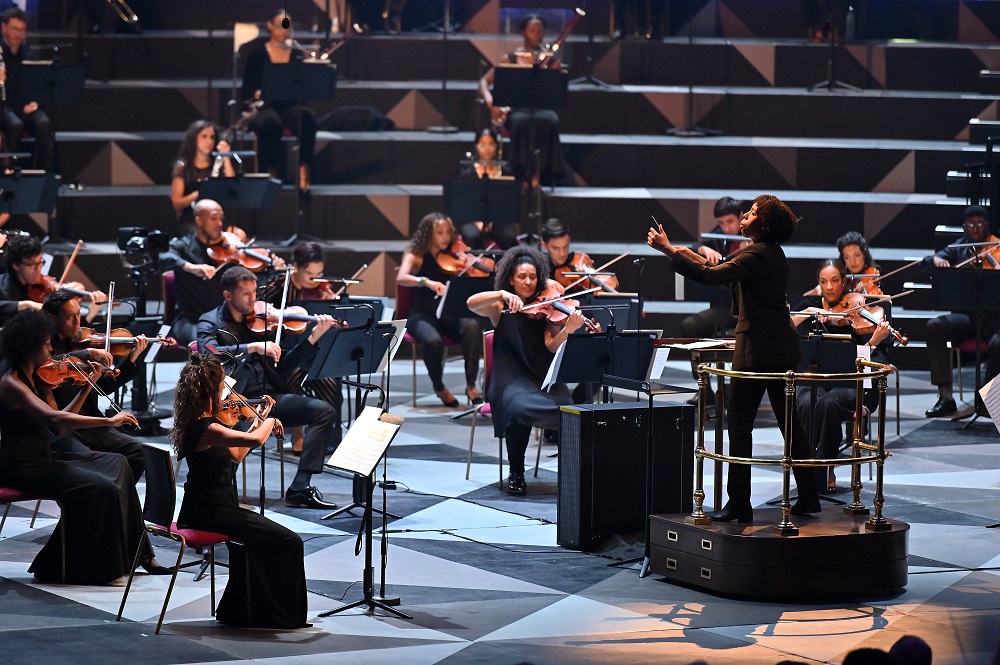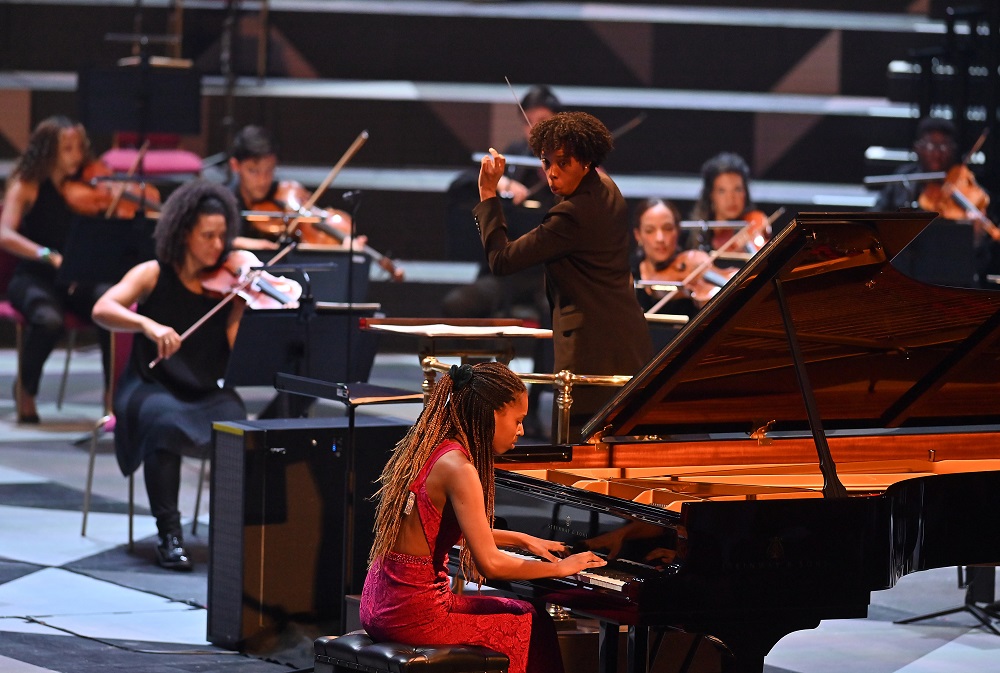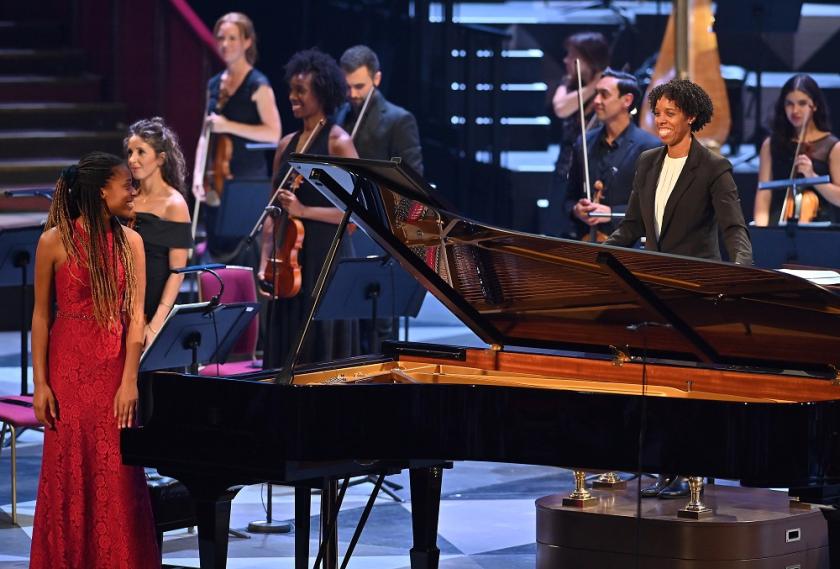Now that you've found her, never let her go. I hope that’s the mantra among players of the Chineke! Orchestra and their Artistic and Executive Director Chi-chi Nwanoku – leading the double basses last night – after this Prom with Panamanian-American conductor Kalena Bovell. With her dancing spirit and focused stick technique regularly at the helm, this team could develop the real musical character that has eluded them under less dynamic and personable figures.
An entire programme of works by Black American and British-based composers only fitfully hit the mark in a generous first half – you wondered whether a refreshingly diverse audience was getting to hear anything like the best that orchestral music has to offer – but culminated in a symphony with a voice, its first three movements performed when Samuel Coleridge-Taylor, son of a white English mother and a doctor from Sierra Leone, was only 21 and still a student at the Royal College of Music.
Coleridge-Taylor’s trilogy The Song of Hiawatha, setting portions of Longfellow’s poem, was a hit, its first part staged – opera-wise- annually at the Royal Albert Hall, some years after his death, between 1928 and the outbreak of the Second World War. The concert overture he created from some of its most swashbuckling themes in 1899 is lively but a bit over-extended, despite the shapely spirit the Chineke! Strings drew from its Scots-snapping main theme. Not so the prodigious symphony. Its ideas rhythmically supple and far from predictable despite being rooted in a tradition then heavily influenced by Brahms (whose Fourth Symphony had been premiered just over a decade before Coleridge-Taylor’s then-uncompleted specimen of 1896).  The beauty of it is that Coleridge-Taylor turns Brahmsian touches such as clarinets in thirds into things of light and humour – at least as Bovell got the players to phrase them – and filters the German master's wistfulness through his own exquisire sensibility in the predominant tone of the anything but stodgy and lamentatory not-so-slow second movement (Larghetto affettuoso) The finale’s calm lifting of the A minor veil and the beautiful ending intimate hard-won peace of mind.
The beauty of it is that Coleridge-Taylor turns Brahmsian touches such as clarinets in thirds into things of light and humour – at least as Bovell got the players to phrase them – and filters the German master's wistfulness through his own exquisire sensibility in the predominant tone of the anything but stodgy and lamentatory not-so-slow second movement (Larghetto affettuoso) The finale’s calm lifting of the A minor veil and the beautiful ending intimate hard-won peace of mind.
The strings’ phrasing of real character and carefully-graded tone here also paid off in the African Suite of Nigerian-born Fela Sowande. Why have I heard so little of this remarkable man? An organ scholar in London, anthropologist and BBC Africa Service staff member, choral conductor, bandleader and jammer with Fats Waller, he surely deserves a decent biography. In this five-movement suite Sowande integrates melodies by Ghanaian composer Ephraim Amu into rich string textures – the harp is the only addition, judiciously used – that should ensure selected movements a much wider circulation. Bovell's flexibility and lightness of touch made the first, “Joyful Day”, a sophisticated pleasure (who’d have guessed she is a fan of heavy and death metal?)  Three andantes in a row make odd bedfellows, but two are short and the central Lullaby shows more real individuality in the strange buzzings that accumulate around the lovely southern Nigerian folk melody. The final dance is a simple delight and drew a spirited response from the young boy several rows in front of me (the way he went with the unorthodox stresses of the symphony in the second half suggested that he should start conducting lessons at an early age).
Three andantes in a row make odd bedfellows, but two are short and the central Lullaby shows more real individuality in the strange buzzings that accumulate around the lovely southern Nigerian folk melody. The final dance is a simple delight and drew a spirited response from the young boy several rows in front of me (the way he went with the unorthodox stresses of the symphony in the second half suggested that he should start conducting lessons at an early age).
Odd one out in the programme was Florence Price’s Piano Concerto in One Movement (three, despite attempted connections; applause broke out after the opening Andante). “Disappeared” between the composer’s first airing of it as soloist in 1934 and a reconstruction of the score a decade ago which has led to a revival of performances very recently. The orchestration is ungainly, the tone uncertain, moving from pianistic flourishes in the first movement that echo the 19th century showpieces to a simple juba dance in the finale. 19-year-old Jeneba Kanneh-Mason (pictured above with Bovell and the orchestra) couldn’t expect to impress much in the outer movements, but her lovely phrasing of the Adagio cantabile’s affecting spiritual finally put her centre-stage, and was mirrored in the unaffected encore, more Coleridge-Taylor – the Impromptu in B minor. But the dancing star conductor and what she made of the symphony will linger longest in the memory.
- Listen to this concert on the BBC Radio 3 iPlayer and watch tomorrow (Thursday 26 August) on BBC Four
- More Proms reviews on theartsdesk














Add comment